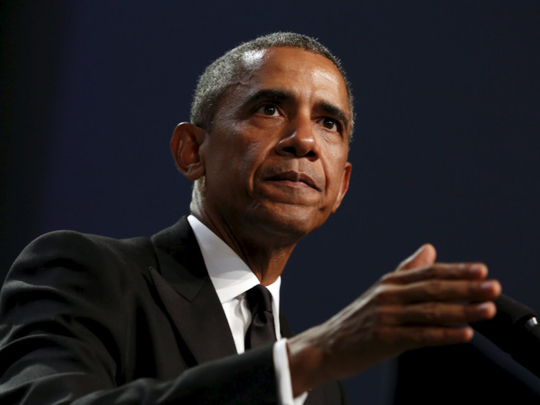
Why does the United States continually send deadly weapons to the Middle East, make things even more chaotic than they were before and expect better results the next time?
As pretty much everyone who was paying attention predicted, the $500 million (Dh1.83 billion) programme to train and arm “moderate” Syrian rebels is an unmitigated, Bay of Pigs-style disaster, with the head of US central command admitting to Congress last week that the year-old programme now only has “four or five” rebels fighting inside Syria, with dozens more killed or captured .
Even more bizarre, the White House is claiming little to do with it. White House spokesman Josh Earnest attempted to distance US President Barack Obama from the programme, claiming that it was actually the president’s “critics” who “were wrong”. The New York Times reported: “In effect, Mr Obama is arguing that he reluctantly went along with those who said it was the way to combat [Daesh or the self-proclaimed Islamic State of Iraq and the Levant], but that he never wanted to do it and has now been vindicated in his original judgement.”
This bizarre “I was peer-pressured into sending more weapons into the Middle East” argument by Obama is possibly the most blatant example of blame-shifting in recent memory, since he had every opportunity to speak out against it, or veto the bill. Instead, this is what Obama said at the time : “I am pleased that Congress ... have now voted to support a key element of our strategy: Our plan to train and equip the opposition in Syria.”
But besides the fact that he clearly did support the policy at the time, it’s ridiculous for another reason: years before Congress approved the $500 million programme to arm the Syrian rebels, the CIA had been running its own separate Syrian rebel-arming programme since at least 2012. It was reported prominently by the New York Times at the time and approved by the president.
In fact, just before Congress voted, Senator Tom Udall told US Secretary of State John Kerry, who was testifying in front of the foreign relations committee, “Everybody’s well aware there’s been a covert operation, operating in the region to train forces, moderate forces, to go into Syria and to be out there, that we’ve been doing this the last two years”. In true Orwellian fashion, Kerry responded at the time: “I hate to do this. But I can’t confirm or deny whatever that’s been written about and I can’t really go into any kind of possible programme.”
Also conveniently ignored by Congress and those advocating for arming the rebels was a classified study the CIA did at the time showing that arming rebel factions against sitting governments almost always ends in disaster or tragedy.
You’d think whether or not the current weapons-running programme was effective — or whether any similar programme ever was — would have been a key factor in the debate. But alas, the CIA programme is never mentioned, not by politicians, and not by journalists. It’s just been conveniently forgotten.
It is true that perhaps the best advocate for why we never should’ve armed the Syrian rebels to begin with came from Obama himself. He had told the New Yorker in early 2014 that “you have an opposition that is disorganised, ill-equipped, ill-trained and is self-divided. All of that is on top of some of the sectarian divisions”. Critically, he cited that same above-mentioned classified study: Very early in this process, I actually asked the CIA to analyse examples of America financing and supplying arms to an insurgency in a country that actually worked out well. And they couldn’t come up with much. He didn’t mention the CIA’s already-active weapons-running program. Why he didn’t stick to his guns since he supposedly was weary of getting the US military involved in yet another quagmire it could not get out of is beyond anyone’s comprehension. Instead, he supported Congress’s measure to create yet another program that sent even more weapons to the war-torn region.
Per usual, Republicans are taking the entirely wrong lessons from this disaster, arguing that if only there was more force then everything would’ve worked out. Marco Rubio exclaimed during the GOP presidential debate last Wednesday that if we armed the rebels earlier — like he allegedly wanted, before voting against arming them when he had the chance — then the programme would’ve worked out. Like seemingly everyone else in this debate, Rubio has decided to ignore the actual facts.
Sadly, instead of a debate about whether America should continue sending weapons to the Middle East at all, we’ll probably hear arguments that the US should double down in Syria in the coming days and get US troops more cemented into a war that America can call its own (that still to this day has not been authorized by Congress). There are already reports that there are US special operations forces on the ground in Syria now , assisting Kurdish forces who are also fighting Daesh.
When the vicious and tragic cycle will end is anyone’s guess, but all signs point to: Not anytime soon.
— Guardian News & Media Ltd
Trevor Timm is executive director of the Freedom of the Press Foundation.









